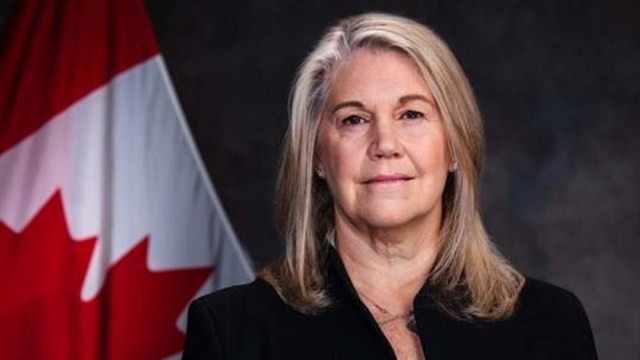Four months after a diplomatic firestorm erupted over Canadian Prime Minister Justin Trudeau’s allegation of a potential Indian link to the killing of Canada-based Khalistan separatist Hardeep Singh Nijjar, a top Canadian official has, for the first time, said that India is “cooperating” with Canada and Delhi is working closely with Ottawa to resolve the issue.
Canada’s National Security Advisor Jody Thomas, who retired Friday after more than 35 years in public service, told Canadian news channel CTV: “I wouldn’t describe them (the Indians) as not cooperating. I think we’ve made advancements in that relationship.”

“My discussions with my counterpart in India have been fruitful, and I think they’ve moved things forward,” she said.
Story continues below this ad
Asked whether Canada’s improved relationship with India was a result of the US indictment (of Indian citizen Nikhil Gupta in an alleged plot to kill Khalistan separatist Gurpatwant Singh Pannun), Thomas said, “The two are connected for sure.”
“The information that they revealed supported our position and our assertions with India. India is working with us, and my counterpart, in particular, far more closely to resolve this,” she said, in comments published by CTV on its website Friday.
“Our ability to function in the Indo-Pacific does rely on having a healthy relationship with India. And I think that we are working back towards that,” Thomas said, on the intent to improve ties with India.
She was appointed to the role as National Security and Intelligence Advisor to Prime Minister Trudeau in January 2022.
Story continues below this ad
Over the last six months or so, Thomas has had multiple conversations on the issue with NSA Ajit Doval since August last year, including on the sidelines of the G20 Summit in Delhi in September.
There was no official response from the Indian government on the outgoing Canadian NSA’s statements.
Diplomatic ties suffered a huge setback after Trudeau said last September that Canada was “actively pursuing credible allegations” that Indian agents were potentially linked to the June 2023 killing of Nijjar, a Canadian citizen.
India denied any government role in Nijjar’s killing, and the Ministry of External Affairs rejected Trudeau’s allegations as “absurd and motivated”.
Story continues below this ad
India’s position towards Canada has been different from how it has responded to the allegations by the US where an alleged plot to kill Pannun, also a Khalistan separatist, was uncovered by US government agencies. The Indian government formed an inquiry committee to look into US allegations.
In early December, External Affairs Minister S Jaishankar told Parliament that there was no question of “equitable treatment” of the US and Canada in relation to the allegations of Indian involvement in the targeting of Khalistan separatists in the two countries, as one had provided inputs to India and the other had not.
Replying to a supplementary question asked by CPM MP John Brittas during Question Hour in Rajya Sabha, Jaishankar said, “Insofar as the US is concerned, certain inputs were given to us as part of our security cooperation with the United States. Those inputs were of concern to us because they related to the nexus of organised crime, trafficking and other matters. Because it has a bearing on our own national security, it was decided to institute an inquiry into the matter and an inquiry committee has been constituted. Insofar as Canada is concerned, no specific evidence or inputs were provided to us. So the question of equitable treatment to two countries, one of whom has provided inputs and one of whom has not, does not arise,” he said.
In an interview with UK daily Financial Times in December, Prime Minister Narendra Modi too said, “If someone gives us any information, we would definitely look into it. If a citizen of ours has done anything good or bad, we are ready to look into it. Our commitment is to the rule of law.”









